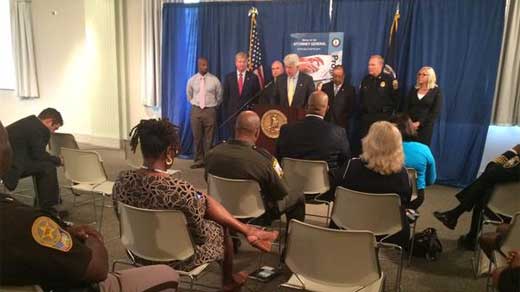VA Attorney General Outlines Impartial Policing Initiative
Virginia’s attorney general is launching an initiative across the state to train police officers how to use force appropriately, de-escalate risky situations and recognize potential biases they may bring to the job.
Herring travelled across Virginia Tuesday, in a series of press conferences, where he said, that minorities often feel they’re treated differently by police.
“Our officers deserve – and our communities expect them to receive – the absolute best training on the latest tools and strategies for safe, impartial modern policing”, said Herring.
Advocates say if officers can be trained to drop their biases, it will build trust and ultimately save lives.
“As we were having those conversations around the state we’re also a few instances here in Virginia that lent urgency to what we were doing and reaffirmation that this was important to do here in Virginia”, Herring said.
The plan involves training for new and existing law enforcement officers across the state.
“These initiatives are in-line with the recommendations of President Obama’s Task Force on 21st Century Policing, and with training initiatives supported by the U.S. Department of Justice and its Office of Community Oriented Policing Services”.
Herring announced plans Tuesday to improve relationships between citizens and law enforcement statewide through a new training initiative. Attorney General Herring told attendees that “the nation has work to do to make sure everyone is represented and treated fairly”.
“Our communities suffer when trust with our police officers erode”, said Herring. “I am proud that his office has recognized that the VSC-NAACP can be and should be a valued ally in his efforts here in Virginia”.
“The attorney general along with his staff has really taken the steps to look at a holistic way of approaching this problem”, Newport News Sheriff Gabe Morgan said during the news conference.
The Attorney General said this training will not begin until next year and there is no set time frame right on when it will end.
Herring added that beyond to talking to the members of the minority community, the data proves changes need to be made.
The training sessions are not required, but many law enforcement leaders say it is necessary.








